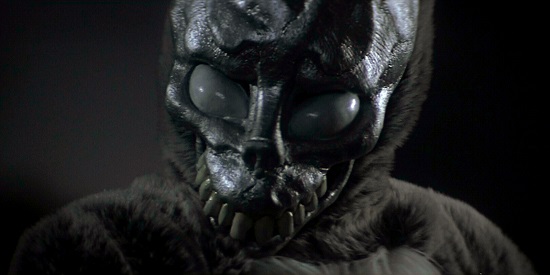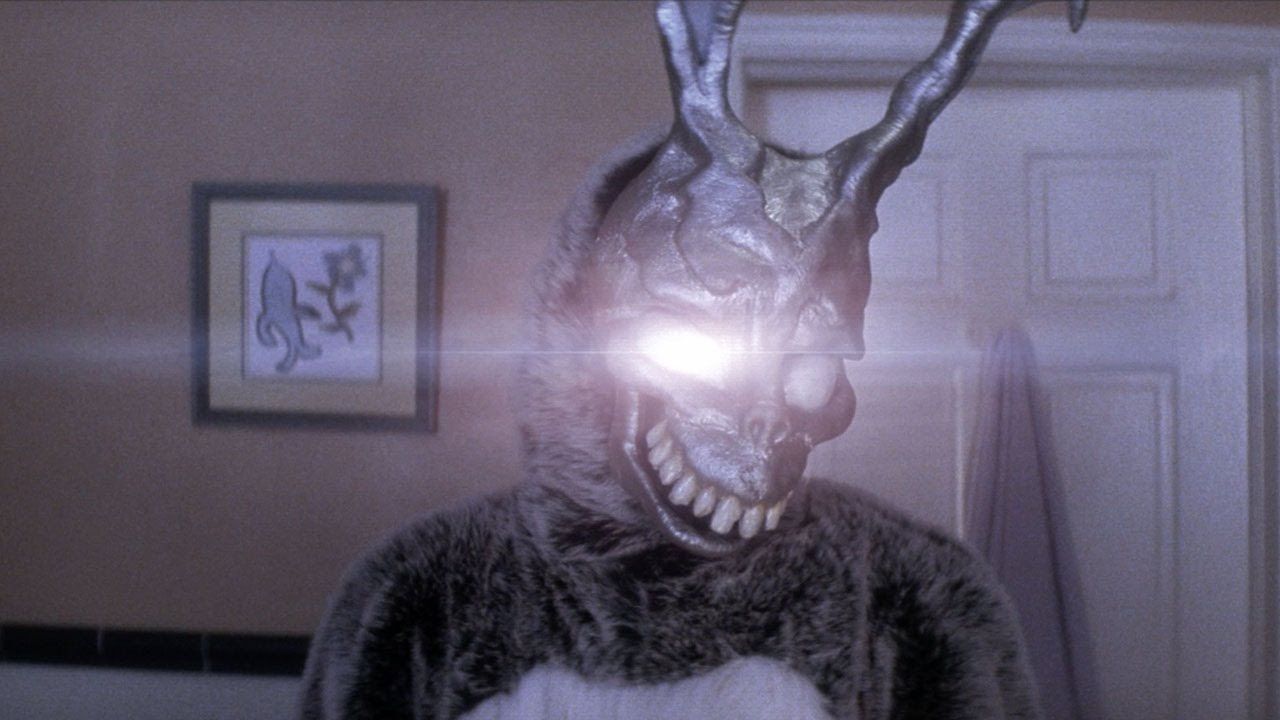Sometimes a film comes along that becomes part of you, and so it was when I hit ‘play’ on a rented DVD of Donnie Darko. I was on the cusp of puberty, a mixed-up kid who had movies instead of friends. Little did I know that 113 minutes later, my 12-year-old mind would be forever warped.
And now that Donnie Darko has been re-released on Blu-Ray, that love affair has been renewed. It’s a near-perfect film, marred only by one or two subpar supporting performances and a minor plot hole or two.
Jake Gyllenhaal’s lead performance has a brilliant oversized awkwardness to it. Even though he was 20 when the film was made, he plays 16/17 so effectively that it remains one of the best cinematic depictions of teenage angst. His wicked smile alone is a testament to how great an actor Gyllenhaal is, something he has proved many times over since that breakthrough role.
The soundtrack had enormous cultural significance, going hand in hand with the renewed interest in post-punk in the early to mid ‘00s. The theatrical cut opens with the iconic scene of Donnie biking home to Echo & the Bunnymen’s ‘The Killing Moon’; Joy Division’s ‘Love Will Tear Us Apart’ is played only minutes before Darko sacrifices himself to save his girlfriend, as does The Church’s ‘Under The Milky Way’. The soundtrack tells the story as much as the script and imagery, to the extent that you could imagine it working as a musical on stage.
Thanks to that combination of narrative, cast, and soundtrack, director Richard Kelly definitely lucked out on his debut feature, even if it bombed when first released in theatres. Within a year Donnie Darko had become a midnight film favourite in New York, and soon after that a bonafide arthouse hit in the UK. Kelly was able to release a director’s cut DVD before he even got his second film off the ground.
However, Kelly hasn’t had much luck since then. His overly ambitious but stunning mindfuck, Southland Tales (2006), only played via the Cineworld chain in the UK. In case you haven’t seen it, it’s as if Philip K. Dick wrote the screenplay for Robert Altman’s Nashville during one of his amphetamine binges, a pop-culture dystopian nightmare set during the last few days of Planet Earth (the 4th of July weekend in an alternative-history version of 2008.) It also features the most crazed stunt-casting imaginable, with the likes of The Rock, American Pie’s Seann William Scott, and most of the then-current SNL cast.
Nevertheless, Southland Tales plays better now as a statement on the Bush years than any other film from that era. It was a mixed-media project with three graphic novel prequels, which of course most of the few people who saw the film never read. It also was supposed to have a website like the one famously set up for Donnie Darko, allowing fans to dig deeper into the film universe, but that was never completed. Southland Tales flopped after a disastrous reception at Cannes.
Kelly’s most recent film was The Box (2009), which, like all of his films so far, deals with conspiracies and time travel. A ‘70s-set sci-fi thriller based on a Richard Matheson short story, Kelly sets much of the action at NASA, where his father worked during that time.
Donnie Darko may remain Kelly’s best film, and is the most significant cult film of recent memory — with the possible exception of Fight Club, although that film’s cult status bloomed almost immediately rather than growing slowly. Darko changed how both teen films and science fiction films were made, and there have been numerous copycats in its aftermath. Its influence is still felt today through projects like Stranger Things and I Am Not A Serial Killer.
Richard Kelly was over in London doing some press for the theatrical and Blu-Ray re-release of Darko, which has been fully remastered. We got down to talking about the film and the re-release.

Whatever happened to Gretchen’s mom?
I’ve never been asked that before. I haven’t put much thought into what happened to Gretchen’s mom. We never cast the role, she was a character who was only spoken about. She was obviously a victim of her husband’s violence, and she and Gretchen have to flee the situation and move to Middlesex. It was kind of a mystery to the audience, because the father seems like he might be involved with what is happening in the beginning. I would like to think she is doing well.
How did Noah Wyle get involved? I’ve always felt his performance is kind of overshadowed by how great everyone else is in the cast.
Richard Kelly: I think Noah’s stepbrother was Jake Gyllenhaal’s assistant on the film, so that was how he came aboard. Noah was great—he only shot for 2 or 3 days, I think.
Obviously, the music is integral to the plot. Did you ever get any responses from the bands about the finished film?
They all licensed the songs to us, which was a blessing. I hope they are proud of the way we used their songs. They are almost all British post-punk/new wave. The music all comes from the same cultural space, and it was really great to license their music before everyone started to gravitate towards the ‘80s. We were sort of ahead of the curve, making a film about ‘80s nostalgia in the year 2000.
When was the moment you realised you had a cult hit after the disappointing theatrical release and Sundance?
When they started running it as a midnight movie in the spring of 2002 in New York, I knew something was up. When I came out here to the UK, I was blown away by the enthusiasm for it. It just connected with people in a way I never realised. I always knew we had something special, and hoped it would hopefully repair itself over time. I never realised it would happen in such a significant degree, and a lot of it happened here in the UK.
Do you have a favourite fan interpretation?
[Laughs] I’ve heard a few insane ones, and I would really have to think what they are. I kind of try to stay out of the whole fan theory realm, and try to let people have their own world with that. I’m sure there are a lot of crazy ones out there, I try not to judge anyone and let people have their own fantasies if they want to have them.
How was it to go back all these years to restore it for the Blu-Ray?
It was great — we’ve been wanting to do this for a long time. When Arrow came and were ready to do it and would pay for it, I was like, “Alright, let’s do it and get it down by Christmas.” It was a lot of work. Steven Poster [the cinematographer] was there with me. We are really proud of what we accomplished, and the image quality is really much better. It was never really maintained, preserved, or transferred properly.
Was there anything you wanted to include on the new disc but couldn’t for whatever reason? (Kelly’s short film) Visceral Matter, for instance?
That is buried in a vault somewhere, and it’s kind of too much. It’s almost 40 minutes long, I think, and I just couldn’t deal with it. They put my USC student film The Goodbye Place on there, and I hope it looks decent enough. That was put on another DVD with other USC films previously, but I’m glad they got that on there.
I know you’re a massive Terry Gilliam fan. Have you ever heard anything from him?
I’ve never met Terry Gilliam, and he is obviously a hero of mine. I would love to get to meet him, but I have no idea if he has seen any of my films. I would be honoured to talk to him about anything.
Any chance of some kind of new Southland Tales release? I’ve noticed a resurgence of interest in that film.
I’m glad people are giving it another chance. No matter what I do in the future, it will always be my favourite. I am also hoping to do a longer, new version of that film: there is a lot more there, and a lot of stuff we weren’t able to finish. It’s probably too sprawling and ambitious to fit in the mould of a feature film. We have all these new resources that we didn’t have ten years ago, it’s a different world in more ways than one. I hope to revisit Southland Tales at some point.
Do you think it has anything to say on the world’s current political climate?
Every day I feel like we are living in some grotesque parallel world, with everything that’s happened recently. The movie almost seems tame by comparison to what he are living, which I never believed possible. We knew it was taking some big risks and presenting a world that nobody 10 years ago believed could get this crazy…
When and what is the next project?
There is a lot of stuff in the works, and there have been a lot of delays. We’ve been working diligently on a lot of things, and hopefully next year we will see something finally coming together. I can’t say any more — I don’t want to jinx anything! I try to focus on the blessings and move forward. I feel like I’m surrounded by a lot of great people who will help me get to the finishing line, finally.
Donnie Darko is out now from Arrow



